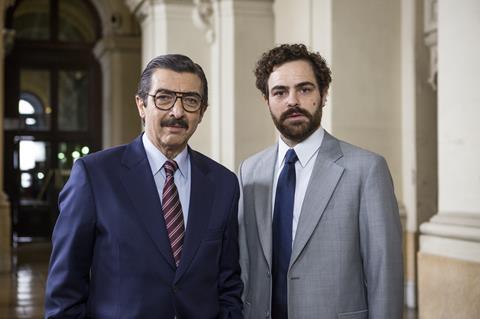The Americas region won Oscars in 2018 and 2019 — with Chile’s A Fantastic Woman and Mexico’s Roma — but has missed out on nominations for the past three years. Screen profiles the candidates hoping to bring a resurgence of success.

The 2023 international feature Academy Award submissions from the Americas bring a combination of new work from returning filmmakers alongside emerging talent whose festival gems demonstrate the region’s broader emerging presence on the world stage.
The continent enjoys a feisty profile at the Oscars, with multiple submissions over the years and a pool of nominations led by Mexico on nine and seven from Argentina, which has won the Oscar twice — in 1986 with Luis Puenzo’s The Official Story, and in 2010 with Juan Jose Campanella’s The Secret In Their Eyes.
Nine years later, in 2019, Mexico claimed its sole win with Alfonso Cuaron’s Roma. Since then, the Americas have provided a handful of shortlist inclusions and while it is fair to say titans Argentina and Mexico are out again in force this time around, films from Colombia and Costa Rica are impressing at major festivals, while the ongoing emergence of film industries in Peru, Panama, Guatemala and Ecuador offers encouragement.
Venice Fipresci prize winner and San Sebastian audience award winner Argentina, 1985, from Argentina, is the latest work by Santiago Mitre, whose Paulina was the Cannes Critics’ Week winner in 2015 and The Summit, starring Ricardo Darin, played Un Certain Regard two years later.
Director and actor reunite on Argentina, 1985, an account of the first public trial of the military leaders who subjected the country to a reign of terror during the ‘Dirty War’ of the late 1970s and early 1980s. Darin plays Julio Strassera, the chief prosecutor who took on the military junta in what proved to be a landmark case. It is the first real-life character Darin has portrayed in a storied career — with credits including The Secret In Their Eyes, Nine Queens and Truman — that has turned him into a superstar across Latin America.
Prime Video holds worldwide rights (excluding Argentina, where Digicine released theatrically) and gave the courtroom drama a platform release in New York prior to an October 21 global launch.
Made in Mexico

Mexican filmmaker Alejandro Gonzalez Inarritu returns with a feature for the first time since 2015’s The Revenant, for which he won the directing Oscar (one year after doing so for Birdman). Bardo, False Chronicle Of A Handful Of Truths premiered in Competition at Venice where it divided the critics.
Daniel Gimenez Cacho anchors the hugely ambitious, lengthy film as a journalist who reflects on life as he prepares to receive an award. Poignantly for a film that explores notions of belonging and statelessness, Bardo is Inarritu’s first film to be set in Mexico since his breakout feature debut Amores Perros in 2000.
Netflix acquired worldwide rights last spring and knows how to make a noise. Its last Mexican hopeful, I’m No Longer Here by Fernando Frias, made it to the 15-film shortlist for the 2021 Oscars.
Post-Venice, Inarritu has chopped 22 minutes off Bardo’s original three-hour running time, and the film launched theatrically in Mexico in late October, five weeks ahead of its Netflix bow on December 16. It opened in the US in select theatres on November 4 and — like Argentina, 1985 — is eligible for the Bafta equivalent category of film not in the English language.
Meanwhile, Netflix holds Americas rights (excluding Colombia and Mexico) to Colombian filmmaker Laura Mora’s second feature, the highly regarded San Sebastian Golden Shell winner The Kings Of The World (Los Reyes Del Mundo).
The follow-up to her 2017 Toronto and San Sebastian selection Killing Jesus, The Kings Of The World follows Medellin street kids who search for inherited land in the jungle. It counts among its producers Cristina Gallego of Ciudad Lunar, which produced Ciro Guerra’s Embrace Of The Serpent and earned the country’s sole nomination in 2016.
Costa Rica is making a name for itself as a hotbed of emerging talent. Ariel Escalante Meza’s Un Certain Regard selection Domingo And The Mist (Domingo Y La Niebla) — about a widower who fights to protect his land from developers — continues a purple patch for the central American country. It follows Clara Sola, the 2022 submission from Nathalie Alvarez Mesen that played Directors’ Fortnight at Cannes; and the previous year’s Land Of Ashes from Sofia Quiros, which also made its bow on the Croisette, in Critics’ Week.
Alejandro Loayza Grisi’s Bolivian hopeful Utama debuted at Sundance, winning the world cinema dramatic grand jury prize with its sedate meditation on climate change as seen through the eyes of an elderly Quechua couple. The eco-drama — Bolivia’s 14th international submission — was released in the US on November 4 by Kino Lorber.
Chile’s Blanquita, by Fernando Guzzoni, is the latest submission from a country with a distinguished record, having taken the Oscar in 2018 with Sebastian Lelio’s A Fantastic Woman and a nomination five years prior for Pablo Larrain’s No. Inspired by actual events, Guzzoni’s fourth film debuted in Venice’s Horizons section and won the best screenplay prize for its story of an 18-year-old foster child who becomes a key witness in a trial.
Brazil at the polls

Brazil has submitted 52 films to the Oscars and earned four nominations. Its next contender is Sundance premiere Mars One (Marte Um), directed by Gabriel Martins, which follows a lower middle-class Black family going about their lives in the wake of a right-wing election victory. The film remains timely given Brazil’s recent presidential election in which divisive populist incumbent Jair Bolsonaro narrowly lost to left-wing former president Luiz Inacio Lula da Silva.
From the Dominican Republic comes Ivan Herrera’s Bantu Mama, the country’s 15th Oscar submission and a SXSW 2021 premiere. It centres on a French woman of African descent who escapes from custody and is taken in by a group of children. Ava DuVernay’s Array Releasing picked it up for the US, Canada, UK, Australia and New Zealand, and was preparing to release on select screens and Netflix on November 17.
Aldo Salvini’s Peruvian sci-fi Moon Heart, about an elderly woman who befriends an ant, marks the country’s 29th submission. Peru’s sole nomination came in 2010 from Claudia Llosa’s Berlinale Golden Bear winner The Milk Of Sorrow.
Panamanian contender Birthday Boy (Cumpleanero) hails from Arturo Montenegro — the prolific filmmaker behind its 2020 submission Everybody Changes — and follows a momentous celebration by a man who plans to kill himself.
Panama has never earned a nomination in the international Oscar category, but made the shortlist of 15 last time around with Abner Benaim’s Plaza Catedral.
Paz Encina’s Eami, about an Indigenous woman who flees settlers, won Rotterdam’s Tiger Award this year. Paraguay hopes it will be its first Oscar nominee in six submissions.
Five submissions from the Americas region — including Bantu Mama — debuted in 2021. Manuel Nieto Zas’s The Employer And The Employee played in Directors’ Fortnight at Cannes, and is vying for Uruguay’s first Oscar nomination after 20 submissions.
Venezuela’s The Box (La Caja), from Lorenzo Vigas, first played at Venice 2021 and follows a young boy’s personal journey against the backdrop of manufacturing corruption in Mexico. It marks the filmmaker’s second submission to this award, following his Venice 2016 Golden Lion winner From Afar.
Ecuador’s postpartum depression drama Lo Invisible from Javier Andrade premiered at Toronto 2021, and is bidding to become the country’s first to gain a nomination in the international feature category.
Anais Taracena’s The Silence Of The Mole (El Silencio Del Topo), from Guatemala, premiered at Hot Docs 2021 before moving on to Sheffield Doc/Fest, where it won the Tim Hetherington Award. The story tells of a journalist in the 1970s who infiltrated the government to help the resistance movement. Taracena’s compatriot Jayro Bustamante directed 2021 Oscar-shortlisted horror La Llorona.
Canada’s entry is Eternal Spring, Jason Loftus’s hybrid documentary film, which marks the 20th anniversary of the hacking of Chinese state TV by the outlawed Chinese spiritual group Falun Gong. Denys Arcand remains the country’s sole winner in the category, with The Barbarian Invasions in 2004.

























No comments yet